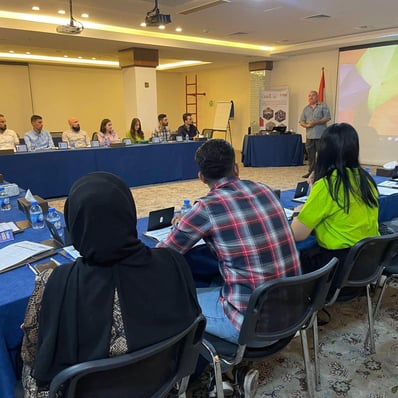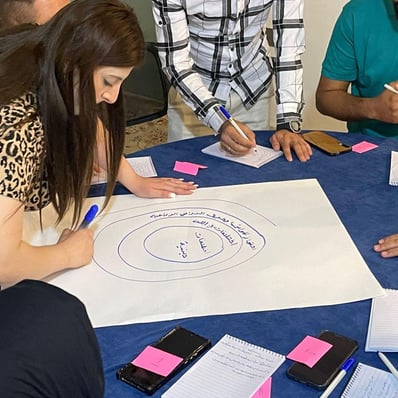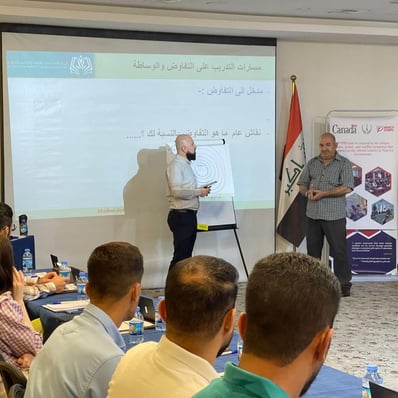Women- and Youth-led Peace and Reconciliation Program
Mercy Corps



I- Background
Mercy Corps is implementing the Women- and Youth-led Peace and Reconciliation Program in Iraq (WYPRI) funded by Global Affairs Canada (GAC), which aims to respond to the unique gender, power, and conflict dynamics that characterize the current context in Ninewa Governorate. Ninewa, one of the most diverse regions in Iraq and among the worst-affected by mass violence and displacement, is facing a critical transition post-ISIS and with the repatriation of internally displaced persons (IDP). Low social acceptance of returnees and discomfort among persecuted minority communities, and in particular women from some of those communities, are significant challenges that require the promotion of inclusive gender- responsive and community-led reconciliation mechanisms. As Iraq moves into recovery and reconciliation, there is also the need to foster the meaningful engagement of women in community-based peacebuilding and conflict mediation structures and to ensure that these structures meet the needs of women, including those who have experienced gender-based violence (GBV).
The WYRPI initiative ultimately seeks to strengthen gender just and inclusive social cohesion within and between diverse communities and identity groups in Al Hamdaniya District, Ninewa Governorate, Iraq. Mercy Corps will partner with the Government of Iraq to pilot a community-led reconciliation dialogue series in Ninewa. This partnership will be outlined and formalized through a Memorandum of Understanding (MoU). WYPRI will work closely with both between and within government entities responsible for supporting peacebuilding, the Dialogue and Community Peace Committee (DCPC) and the Women’s Empowerment Office (WEO), which sits under the Office of the Prime Minister. WYPRI Program is guided by the following theory of change: By creating an enabling environment for inclusive, gender-responsive, and community-driven reconciliation and increasing women and young peoples’ leadership in gender-responsive peacebuilding, women and men from diverse communities and identity groups will be better positioned to socially reintegrate and coexist in Al Hamdaniya District.
The WYPRI is structured into two intermediate outcomes, the first of which will be guided in part by the findings from the research piece (an initiative aimed at better understanding the specific experiences and perspectives of women and youth—in particular those from marginalized and persecuted communities—related to their participation in reconciliation processes):
1. Strengthened locally led, inclusive, and gender-responsive reconciliation processes facilitated with women and men from communities and identity groups affected by conflict and violence.
2. 2.Enhanced leadership by women, young women, and young men from diverse communities and identity groups in the delivery of inclusive gender-responsive peacebuilding.
II- Introduction
Mercy Corps contracted with the exploration for research, training, and development company in order to train the selected participants on interest-based negotiation and mediation, focusing on the most gender-based participation and response, in addition to training on mediation tracker, which will be based on data collection and follow-up of identified issues during the other phases of the program. The training continued for four days, from July 26-29, 2023, in Erbil, with the participation of thirty mediators (16 Male, 14 Female) from the Al-Hamdaniya district and representatives of the Nineveh government. The training focused mainly on the following themes:
• Negotiation and mediation training tracks
• Steps to successful preparation for the negotiation process
• Conflict management by negotiation
• Firmness and cooperation in the negotiation process
• Competition in the negotiation process
• Confronting the competitive style in the negotiation process
• Conditioning in the negotiation process
• The basic framework for negotiation and the negotiation process
• Managing the negotiation process
• Mediation and the pathways of the mediation process
• Mediation paths
• Mediation principles
• Principles of gender sensitive mediation
• Trajectories of gender and vision to role and status
• The basic elements of mediation
• Negotiation models
• The integrated picture of women's participation in mediation processes
• Developing the gender agenda
• Mediation and effective communication
III- Workshop Aim and Objectives
The main aim of this step of the is to lead a workshop to provide the project participants with the necessary knowledge and practices on more gender-responsive and inclusive conflict mediation (Updated GRI-IBNM Approach) and the mediation tracker usage and analysis, in addition to the provision of Training of Trainers (ToT) to the government representatives (facilitators) on the same topic. To achieve this aim, the ERD team had set up the following objectives:
1. Enhancing participants' understanding of mediation and negotiation.
2. Expanding the participants' comprehension of the management and analysis tools available to mediators.
3. Improving the participants' negotiating skills.
4. Enhancing the participants' mediation process management skills.
5. Developing the abilities of participants regarding the significance and impact of effective observing in mediation.
6. Building the capacity of participants to incorporate gender into the negotiation and mediation process.
IV- Training Methodology
During the design of the training materials and activities, the ERD lead team took many key considerations to ensure that participants are properly and thoroughly taught on the proposed topics. Those considerations are:
• Proactive: Learning by doing.
• Responding to demands: The training was designed to respond to the actual community needs, government entities’ requirements and country strategic plan.
• Integrated: Capacity building activities must reflect the newly designed initiatives and may also support activities already underway.
• Sustainable: The outcomes of the training sessions should have a significant impact on the ground to both community and government in the target areas. Each training session utilizes a two-tiered approach: the first provides participants with a solid theoretical foundation from which to address the issues, and the second allows participants to apply this knowledge through practical exercises and group work. These two approaches contain five modules - modules one and two are the theoretical part which seek to provide participants with the required knowledge on organizational working systems and technical aspect, thereby enabling them to choose the appropriate frameworks, methods and tools. Module three includes a series of case studies that demonstrate how to use the principles, methodologies, and tools given in the previous modules. Module four includes a variety of group exercises that will allow participants to put what they've learned into practice. And module five which provides the training workshop's conclusions, lessons learned, and pre- post-tests. Errors to avoid would be noted as well. Participants were asked to provide recommendations for future sessions throughout the assessment process.
تواصل معنا
info@erd.com.iq
+964 770 795 6358
© 2024. جميع الحقوق محفوظة
+44 748 023 7212
